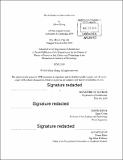The aesthetics of decentralization
Author(s)
Zhang, Zhexi,S.M.Massachusetts Institute of Technology.
Download1135874523-MIT.pdf (18.08Mb)
Other Contributors
Massachusetts Institute of Technology. Department of Architecture.
Advisor
Renée Green.
Terms of use
Metadata
Show full item recordAbstract
This thesis explores ways in which decentralized network technologies are used to experiment with and design new modes of socio-technical organization. Drawing on an understanding of aesthetics as a "distribution of the sensible" and Jack Burnham's notion of "systems esthetics", an artistic engagement with society's technological modes of organization, I explore the ways in which the "aesthetics of decentralization" articulates a circuit of desire connecting technical systems, cultural metaphors and social forms. A key countercultural motif in the history of the World Wide Web, decentralization imagines that political objectives of openness, freedom and even libertarian self-sovereignty within a networked society can be achieved through the technical protocols. Chapter 1 examines the logics of the "stack" and the "platform" as the vertical and lateral organizational abstractions of this environmental matrix. In seeking to negate this centralization of power over digital networks, the decentralized web is a multifaceted technological and cultural phenomenon with disparate agendas, but broadly seeks to reconfigure the technical organization of the web as a commons-oriented peer-to-peer framework. Chapter 2 examines in detail the primary concepts of the decentralized web, reading their propositions as an effort to reconstitute the terms of space, ownership and participation within the networked world. I argue that the decentralized web represents not so much a technical solution as a performative metaphor through which digital publics are called forth in order to denaturalize these hermetic socio-technical environments and imagine new spaces of possibility. In Chapter 3, 1 argue that the imaginary and aesthetic power of the decentralized web flows from the subjective experience of software as worldbuilding, a process which imputes the rational consistency of synthetic "microworlds" upon the wider social domain. In conclusion, I suggest that the decentralized web falters as a political project because in seeking to build new forms of sociality through software, it fails to antagonize the structures of technological capitalist society. Nonetheless, the conceptual and performative metaphors engendered by these experimental systems call forth new technological discourses in which protocol serves as a guide, rather than a coercive armature, of a social imaginary.
Description
Thesis: S.M. in Art, Culture and Technology, Massachusetts Institute of Technology, Department of Architecture, 2019 Cataloged from PDF version of thesis. Includes bibliographical references (pages 79-86).
Date issued
2019Department
Massachusetts Institute of Technology. Department of ArchitecturePublisher
Massachusetts Institute of Technology
Keywords
Architecture.